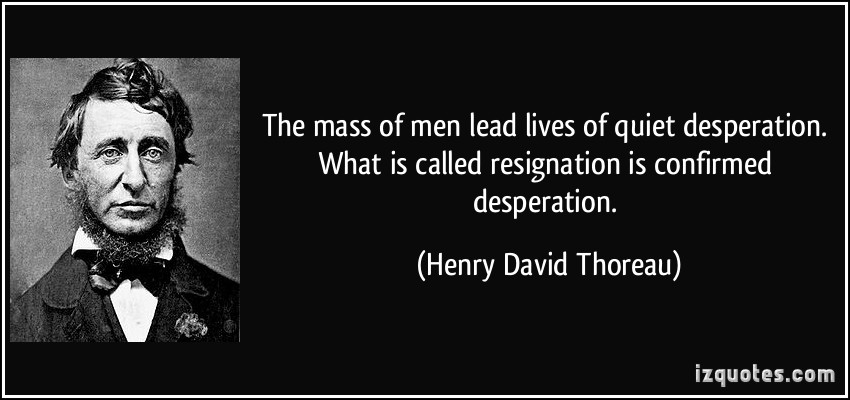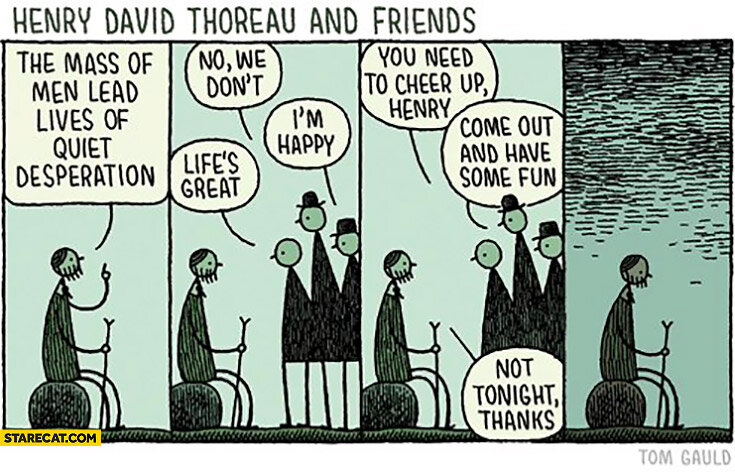Most Men Live Lives of Quiet Desperation: A Deep Dive
By recognizing and addressing the "quiet desperation" in our own lives, we can aspire to lead lives of fulfillment, purpose, and genuine happiness.
By recognizing and addressing the "quiet desperation" in our own lives, we can aspire to lead lives of fulfillment, purpose, and genuine happiness.

"Most men lead lives of quiet desperation." This simple yet profound statement from Henry David Thoreau's "Walden" has echoed through the ages.
Written in the 19th century, its relevance today remains undiminished, if not enhanced.
What did Thoreau mean, and how does this sentiment relate to contemporary life?
In this exploration, we'll dissect the meaning and implications of living a life of "quiet desperation."

Henry David Thoreau lived in a small cabin near Walden Pond in Massachusetts for two years, where he wrote "Walden."
This book, part philosophical treatise and part social critique, discusses the author’s experiment in simple living.
Thoreau's critique was not just of the industrial age but of the human condition itself.
Thoreau wrote during the Industrial Revolution.
A period when people began leaving rural settings for urban environments, seeking better livelihoods in factories.
It was an age of transformation, but also one where many felt disconnected from nature and themselves.
 The Silence of the Internal Struggle
The Silence of the Internal Struggle"Quiet desperation" signifies an internal struggle that isn't always visible.
Many people, despite appearing content or even successful, grapple with a profound sense of dissatisfaction or unfulfillment.
This desperation remains silent because societal norms often discourage open expression of such feelings.
Thoreau suggests that this isn't a niche experience but rather a widespread condition.
Most people, regardless of their station or circumstance, at some point, feel the weight of unrealized dreams, unmet expectations, or the seeming futility of their daily grind.

Today, we live in a world hyper-connected through technology. Yet, many feel more isolated than ever.
Social media platforms can sometimes amplify feelings of inadequacy or loneliness, as individuals compare their lives to the highlight reels of others.
Modern economies, especially in urban settings, often require individuals to work long hours in jobs they don't love to maintain a certain lifestyle.
This perpetual chase can lead to burnout and a sense of being trapped in an unending cycle.

While Thoreau advocated for simplicity, he wasn't just talking about a minimalist lifestyle.
He was suggesting a life that is purposeful and in tune with one's true nature.
Finding purpose, whether through work, relationships, or personal passions, can be a potent antidote to feelings of desperation.
In the digital age, prioritizing real-world interactions and deep, meaningful relationships can counteract feelings of isolation.
Human beings are inherently social creatures, and genuine connections can provide a sense of belonging and understanding.
Taking time to reflect, meditate, or simply be in the present moment can help individuals connect with themselves.
This practice, which Thoreau himself championed during his time at Walden Pond, can offer clarity and peace in a chaotic world.

More than a century and a half after Thoreau penned those words in "Walden," they still resonate powerfully.
They serve as a reminder that, regardless of the era, human beings crave meaning, connection, and a sense of purpose.
In acknowledging the quiet desperation, society can work towards addressing the root causes, fostering environments where individuals can thrive both internally and externally.
By recognizing and addressing the "quiet desperation" in our own lives, we can aspire to lead lives of fulfillment, purpose, and genuine happiness.
For students exploring such themes, EduWriter.ai provides invaluable support in crafting well-researched essays and analyses.
Your cart is currently empty.
Start Shopping
Why do people, seemingly always, reduce every facet of life and life’s experiences to ‘faith in Jesus’….and if there is a God why do we thank ‘him’ when things go well for us but never ‘not thank him, when bad things happen. Why can’t we stand on our own to feet and say ‘I am here, this is me, I try and sometimes fail and I accept that what happened was not destiny, not Divjne intervention ….it just WAS.
The antidote to Thoreus conclusion about life is discovering the truth of why we are here and where we are going. The hope that i have in Jesus Christ has given me fulfilment, the knowledge that through all my hardships and trials my life has not been in vain.